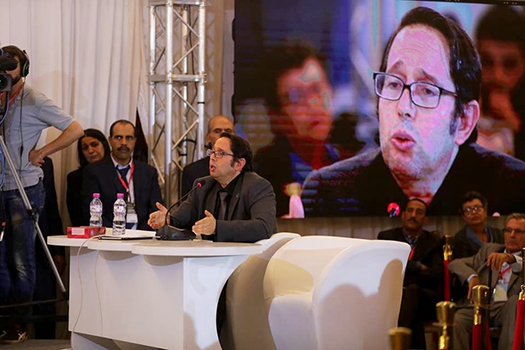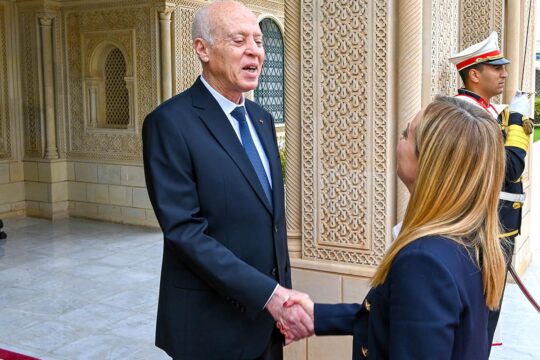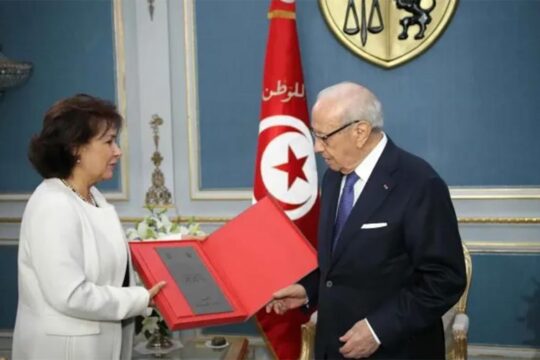Something unusual happened on the first day of the public hearings being held by Tunisia’s national Truth and Dignity Commission. Sami Brahim came forward to give personal testimony of having survived sexual violence in prison during the Ben Ali regime.
Mr. Brahim told the hundreds of Tunisians listening in the room, and thousands more following live on TV and the Internet, about his arrest as a student in the 1990s and his experience of abuse and torture while in jail: "All the prisoners were stripped, the young and the elderly. For an entire week, everyone was kept naked. Why? What was our crime? What was our punishment?"
His testimony helped bring to light an issue considered too sensitive in most cultures to speak about, leaving countless victims in the shadows. It shows that sexual violence is not just a women’s issue that can be left to women’s rights advocates. It is an issue requiring broader attention and action, particularly given how universal it is in scope.
As just a few examples, we know from our work that these abuses have happened in Chile in the 1980s, South Africa during apartheid, Bosnia during the Yugoslav war and now in Syria under Bashar al-Assad.
Watch: Sami Brahem's Testimony
As efforts grow across the globe to uncover the details of a painful past as a way to ensure that victims are recognized, perpetrators are punished and removed from positions of power and such abuses never happen again, more and more stories like Mr. Brahim’s are coming to light.
And while there is broad consensus that victims of human rights violations deserve both justice and acknowledgment of the harms they have experienced, and that the truth should be preserved in the national memory of an afflicted society, most such efforts have excluded male victims of sexual violence.
In many cases, male victims have come to feel like it is useless or unsafe to report acts of sexual violence, even to truth commissions and war crimes tribunals. Past efforts have been unhelpful and demeaning at best, with some doctors in Uganda referring male victims to gynecologists and even blaming and shaming at worst, accusing victims of having “wanted it” or labeling them as homosexual, including in contexts where homosexuality is socially unacceptable or illegal.
According to our findings, published in a recent report, part of the problem is that accountability and acknowledgment measures, such as truth commissions, reparations, trials and reforming police and other security agencies do not incorporate the same special measures to encourage and facilitate male victims to come forward as they increasingly do for women.
For example, while truth commissions often hold closed hearings where women victims of sexual violence can testify with higher levels of privacy, they have not done the same for men. Similarly, while investigators and those taking statements from victims may be trained to look for “coded” language from women suggesting they have suffered sexual violence, they are not trained to identify the equivalent signs in men.
Another challenge is that even when male victims do come forward to report their experiences, the sexual nature of these violations tends to be ignored. Genital beatings, enforced nudity or castration are often recorded and treated as purely physical forms of violence, even when similar violations against women are recognized as sexual.
Such thinking minimizes the experiences of victims like Mr. Brahim, who explained the long-term suffering he has lived with: "You are defeated, you feel humiliated, you do not respect yourself anymore. That is the goal."
Without active acknowledgment of sexual violations against men and boys, efforts to address injustices of the past—including by government agencies, criminal justice authorities, nongovernmental organization workers, health care providers and international organizations—will be hard-pressed to develop inclusive and effective responses.
This can make it difficult or impossible for these victims to access specialized forms of redress from the state. This happened in Sierra Leone, where men who reported certain forms of sexual violence to the country’s truth commission were registered as victims of “physical violence,” making them ineligible for specialized support for survivors of sexual violence.
It also makes it impossible for a society dealing with a history of violence and oppression to understand the full range of harms that was committed. Testimony like Mr. Brahim’s at Tunisia’s ongoing truth commission public hearings are changing the way Tunisians understand the past. Ideally, this will lead to wider discussions about sexual violence in Tunisia and ways to address it.
All of us working for acknowledgement and accountability for crimes committed during dictatorship or war must rise to the challenge of finding effective ways of uncovering, responding to and preventing sexual violence against all victims, including men and boys. This starts with learning from past shortcomings and beginning to actively address the experiences and perspectives of male victims of sexual violence.
Otherwise, we risk failing many thousands of victims and leaving them with their dignity scarred and serious, long-term needs unmet.
This article was first published by ICTJ.





